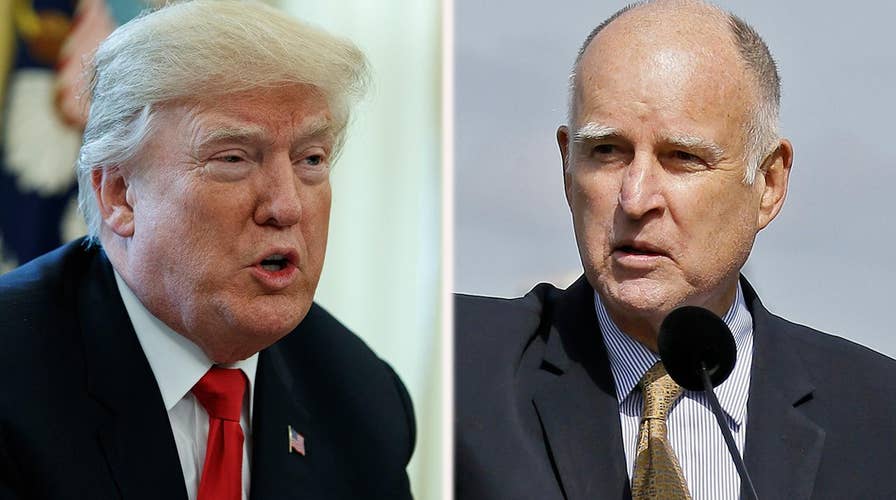Gov. Brown butts heads with President Trump over immigration
California governor pardons two immigrants set for deportation, including one with a felony weapons charge; reaction from Fox News contributor Jason Chaffetz.
President Trump took aim at California Gov. Jerry Brown on Saturday for pardoning five ex-convicts facing deportation, asking if residents of the Golden State “really want” such policies for criminal immigrants.
The president referred to Brown as “Moonbeam,” a nickname he was given in the late 1970s during his first time as governor for proposing a California space academy and later adopting a plan to launch and orbit a satellite for emergency communications.
“Governor Jerry 'Moonbeam' Brown pardoned 5 criminal illegal aliens whose crimes include (1) Kidnapping and Robbery (2) Badly beating wife and threatening a crime with intent to terrorize (3) Dealing drugs. Is this really what the great people of California want? @FoxNews,” tweeted Trump.
The president’s remarks follow Brown’s pardon Friday of 56 convicted felons, two of whom were members of families that fled the Khmer Rouge regime in Cambodia four decades ago.
It was the Democrat governor’s third consecutive pardon round in which he intervened on behalf of immigrants who faced deportation because of criminal conditions.
The pardons don’t automatically stop deportation proceedings, but they eliminate the state convictions on which federal authorities based their deportation decisions on.
"The pardon does provide enormous benefit to immigrants facing deportation," said Anoop Prasad, an immigration staff attorney at Asian Law Caucus.
Trump’s remarks continued a war of words between him and Brown, who has accused the administration of “basically going to war” with California over immigration policy.
Brown last year signed sanctuary legislation limiting state and local cooperation with federal enforcement of immigration laws.
Attorney General Jeff Sessions responded with a Justice Department lawsuit seeking to invalidate three state laws protecting residents living in the country without documentation.
The pardons included Sokha Chhan and Phann Pheach, both of whom face deportation to Cambodia, a country ruled in the 1970s by the genocidal Khmer Rouge. Chhan was convicted of two counts of misdemeanor domestic violence in 2002 and served 364 days in jail.
Pheach was convicted of possessing drugs and obstructing a police officer in 2005 and served six months in jail. His wife said he is in federal custody.
Also pardoned was Daniel Maher, who was convicted in 1995 of kidnapping, robbery and being a felon in possession of a firearm and served five years in prison. Maher is facing deportation to China.
Chhan, Pheach and Maher hold permanent U.S. residency but had exhausted all legal avenues to fight deportation, making Brown's pardons for them their last hope to stay in the U.S., Prasad said.
"This is a life-changing, enormous event," he said.
Also pardoned while facing deportation were Daniel Mena and Francisco Acevedo Alaniz, but their home countries were not immediately known. Mena was convicted in 2003 of possessing illegal drugs. Alaniz served five months in prison for a 1997 auto theft conviction.
Brown on Friday also commuted the sentences of 14 others convicted of crimes.
The governor is a former Jesuit seminarian and traditionally issues pardons close to major Christian holidays. Easter falls on Sunday.
The Associated Press contributed to this report.




